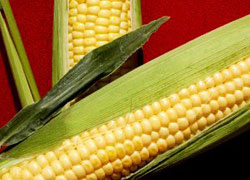 |
| Of the 1.02 million tons of ethanol China produced in 2005, 76 percent was derived from corn. |
As the prices of corn and other grains rise with the surging demand for crop-derived fuels, China’s government is assuring the public of sufficient food supplies, reports China Daily. Chinese vice-minister of finance Zhu Zhigang said the nation’s biofuels—mainly ethanol and biodiesel—must be produced from excess grain only and that “the government will impose strict controls on any biofuel project using grain as the raw material.” He added that China will encourage the use of non-grain agriculture and forestry plants as feedstock for the fuels.
In 2005, China produced 1.02 million tons of ethanol, 76 percent of which was derived from corn. The rest was made from wheat and sorghum. Zhai Huqu, president of the Chinese Academy of Agricultural Sciences, cautions against using too much grain for biofuel production. “We can do research on using corn and other grains as an energy substitute but it cannot be industrialized,” he says. “It will be a disaster for us if we depend on a huge amount of corn and other grains for energy.”
Building a raw material production base on land that is currently uncultivated will require developing biofuel projects that use agricultural plants and wastes as feedstock, says the Daily. Statistics estimate that 133 million hectares of land in China is suitable for developing agricultural and forestry products. The nation also generates 600 million tons of stalks, leaves, and other farming and forestry waste.
Worldwatch Institute biofuels specialist Suzanne Hunt notes that while it is encouraging that China is shifting to non-food feedstock for biofuels to reduce pressure on food supplies, the potential for the Chinese government to encourage the use of previously uncultivated land is worrisome. “If virgin habitats are destroyed for energy production, the environmental gains obtained from liquid biofuel production will be negated,” she says. “The Chinese would be smart to first utilize organic waste streams and residues, to work on integrated food and energy cropping systems, and to make a concerted effort to manage forests sustainably so they will generate fuel for generations to come.”
This story was produced by Eye on Earth, a joint project of the Worldwatch Institute and the blue moon fund. View the complete archive of Eye on Earth stories, or contact Staff Writer Alana Herro at aherro [AT] worldwatch [DOT] org with your questions, comments, and story ideas.